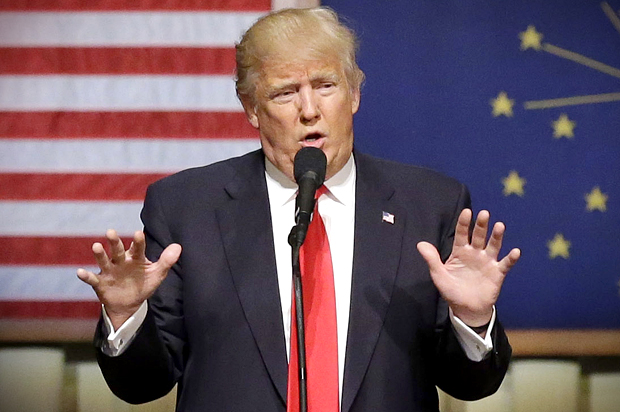Last Wednesday, the New York Daily News got a lot of attention for its front page about Donald Trump’s capturing of the Republican presidential nomination.
“Republican Party, 1854-2016,” the headline read over a picture of a dead elephant. “Dearly beloved, we are gathered here today to mourn the GOP, a once-great political party, killed by epidemic of Trump.”
This idea that Trump may have “killed” the GOP has popped up now and again during the 2016 race, but the Daily News took the idea to its logical conclusion. It’s an attractive notion, but it makes no sense at all, and anyone who thinks that Trump has driven some sort of stake in the heart of the Republicans is kidding themselves.
To begin with, this sort of declaration supposes that there was a much much better GOP around to be murdered by Trump. But there wasn’t. Trump is unique in the openness of his racism, his singularly vulgar public presence and his overt appeals to mob justice, but he sits atop a party that’s made bigotry, authoritarianism and oligarchy the core pillars of its public policy. Republicans didn’t need any encouragement from Donald Trump to attack voting rights or embrace torture or promise to gut the safety net. Trump’s not leading the vicious anti-trans movement that’s sweeping the nation. He didn’t bring Sarah Palin or the Tea Party into the universe. Put simply, Trump won because he turned the messages the Republican Party has been sending out for decades up to full volume and reaped the rewards.
More importantly, though, it’s a misreading of both past and present history to declare that the GOP is in a terminal condition. Even after its descent into Trump madness, we’re still talking about a party that controls Congress and a majority of state legislatures and governorships. Democrats could take the Senate back, but that is by no means a done deal. It’ll be a miracle if they recapture the House. If Hillary Clinton wins in November and fights to be re-elected, she’ll be attempting to win a fourth straight presidential term for the Democrats, something that hasn’t been achieved by either party since the days of Harry Truman. Republicans may be suffering through a particularly acute identity crisis, but they retain substantial power across the country.
Even a cursory glance at the past shows that it’s almost always foolish to declare that a party is politically dead. Here’s a passage from Rick Perlstein’s “Before The Storm” summing up some of the media reaction to Barry Goldwater’s landslide loss in 1964:
“Barry Goldwater not only lost the presidential election yesterday but the conservative cause as well,” the New York Times’s Scotty Reston wrote. “He has wrecked his party for a long time to come and is not even likely to control the wreckage.”
[…]
If the Republicans become a conservative party, “advocating reactionary changes at home and adventures abroad that might lead to war,” wrote the Los Angeles Times’s Washington bureau chief, “they will remain a minority party indefinitely.”
How did those predictions of political oblivion turn out? Four short years later, the GOP was back in power with Richard Nixon at the helm. Twelve years after that, the conservative movement had taken the Republicans over, and Ronald Reagan became president and swung American politics in a sharply rightward direction. Put together, the GOP held onto the presidency for all but four of the years between 1968 and 1992. And just after Bill Clinton was installed in the White House (ending another long dry political spell, by the way) Republicans broke the 50-year Democratic majority in the House and went on to control Congress for another dozen years.
In a two-party system, parties keep living. They sort themselves out. They claw their way back. There are exceptions, obviously, but they usually involve one party supplanting another in the system. That’s what happened when the Republicans replaced the Whigs back in the 19th century, and that was during the greatest period of political turmoil in American history. It doesn’t require a lengthy investigation to notice that there’s no viable third force capable of ousting the GOP from the right wing of U.S. politics.
Eventually, Republicans will make some concessions to the settled culture of the 21st century. They’ll ease off on their hatred of immigrants and queer people. They’ll have to. If they don’t, they won’t survive, and they want to survive. And sooner than lots of people probably think, they’ll win the presidency again. That’s how it goes. Even Donald Trump can’t stop that.

